-
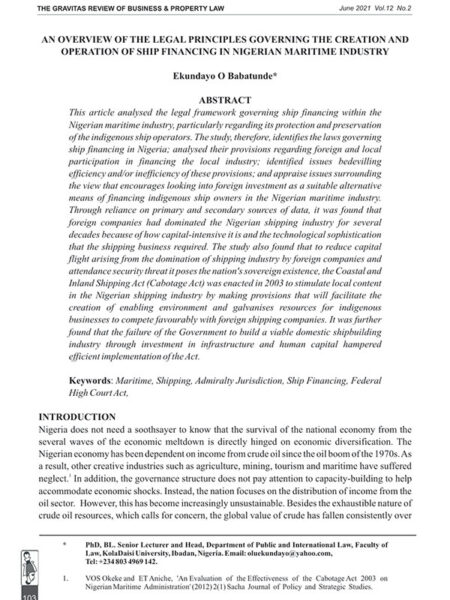
An Overview of the Legal Principles Governing the Creation and Operation of Ship Financing in Nigerian Maritime Industry
0₦2,500.00Dr Ekundayo Babatunde, Senior Lecturer, Faculty of Law, KolaDaisi University Ibadan Nigeria, in his article, An Overview of the Legal Principles Governing the Creation and Operation of Ship Financing in Nigerian Maritime Industry, analyses the legal framework governing ship financing in the Nigerian maritime industry. He considers laws governing ship financing in Nigeria with particular attention to foreign and local participation in the maritime industry. Babatunde explores global best practices on the protection of local maritime industry, Nigeria’s experience with Cabotage and other burning issues in the Nigerian maritime industry.
-
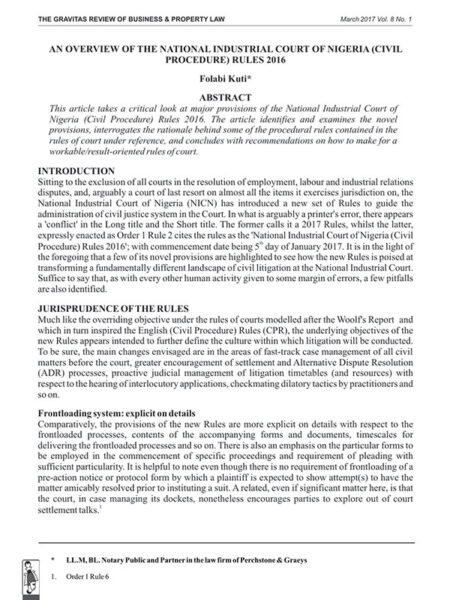
An Overview of the National Industrial Court (Civil Procedure) Rules 2016
0₦2,500.00Folabi Kuti, Partner, Perchstone & Graeys gives “An Overview of The National Industrial Court of Nigeria (Civil Procedure) Rules 2016” in his beautifully written article. He x-rays the salient and revolutionary provisions of the new Rules, the confusion between the short and long titles, and the applicability of ratified but undomesticated treaties by the National Industrial Court.
-
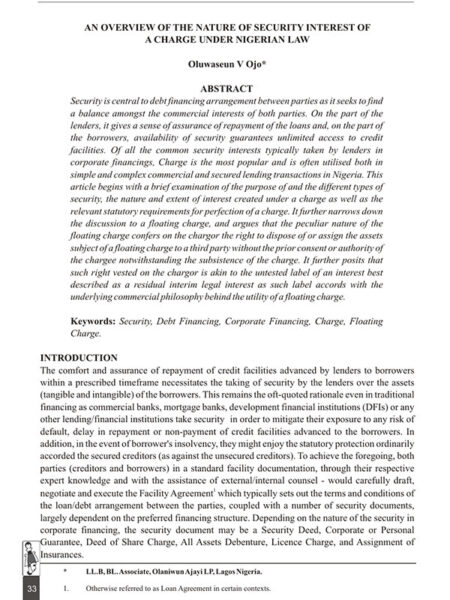
An Overview of the Nature of Security Interest of a Charge under Nigerian Law
0₦2,500.00Oluwaseun Ojo, Associate at Olaniwun Ajayi LP undertakes An Overview of the Nature of Security Interest of a Charge under Nigerian Law. He observes that security is central to debt financing arrangement between parties as it seeks to find a balance amongst the commercial interests of both parties. On the part of the lenders, security gives a sense of assurance of repayment of the loans and, on the part of the borrowers, availability of security guarantees unlimited access to credit facilities. Of all the common security interests typically taken by lenders in corporate financings, the Charge is the most popular. It is often utilised both in simple and complex commercial and secured lending transactions in Nigeria. Ojo examines the purpose of and the different types of security, the nature and extent of interest created under a charge and relevant statutory requirements for perfection of a charge.
-
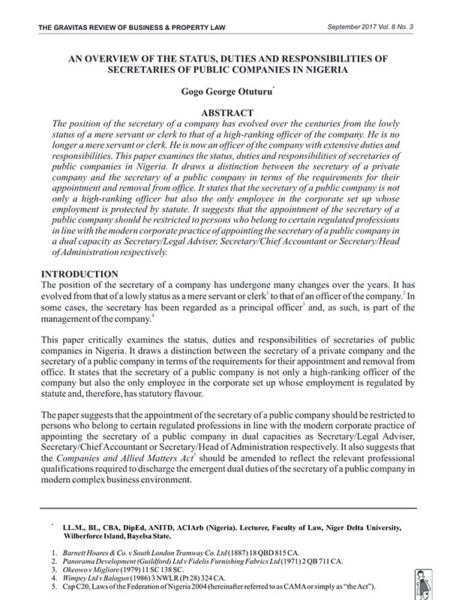
An Overview of the Status, Duties and Responsibilities of Secretaries in Public Companies in Nigeria
0₦2,500.00Gogo Otuturu, Lecturer, Faculty of Law, Niger Delta University, Wilberforce Island, Bayelsa State, provides “An Overview of the Status, Duties and Responsibilities of Secretaries of Public Companies in Nigeria”. He draws a distinction between the secretary of a private company and the secretary of a public company in terms of the requirements for their appointment and removal from office. He notes that the secretary of a public company is not only a high-ranking officer but also the only employee in the corporate set up whose employment is protected by statute. He posits that the modern corporate practice of appointing the secretary of a public company in a dual capacity as Secretary/Legal Adviser, Secretary/Chief Accountant or Secretary/Head of Administration should lead to a rethink of the qualifications of the secretary of a public company.
-
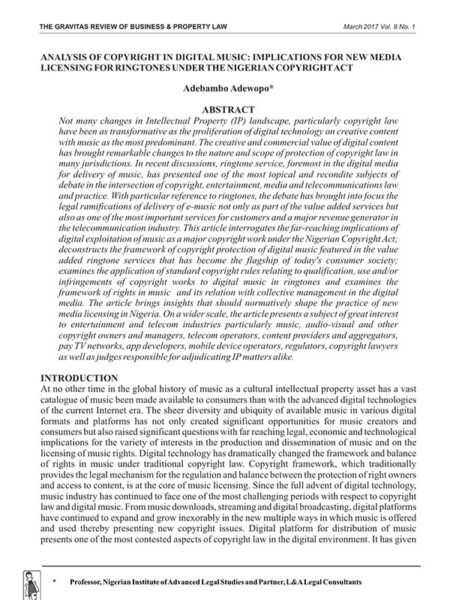
Analysis of Copyright in Digital Music: Implications for New Media Licensing for Ringtones under the Nigerian Copyright Act
0₦2,500.00Professor Adebambo Adewopo of the Nigerian Institute of Advanced Legal Studies and Partner, L & A Legal Consultants, in his article “Analysis of Copyright in Digital Music: Implications for New Media Licensing for Ringtones Under the Nigerian Copyright Act” provides a seminal exposition of the intersection of copyright law and entertainment, media and telecommunication industries in Nigeria, addressing the most contested and recondite issue in those industries at the moment. The article interrogates the far-reaching implication of digital exploitation of ring tunes under the Nigerian Copyright Act; deconstructs the framework of copyright protection of digital music; considers the copyright rules for qualification, use and infringement of work, and application to digital music in ringtones; examines issues relating to the key rights and collective management in the digital media under the extant Copyright Act and discusses insights that should shape the practice of new media licensing that is ultimately of great interest to practitioners in the creative economy.
-
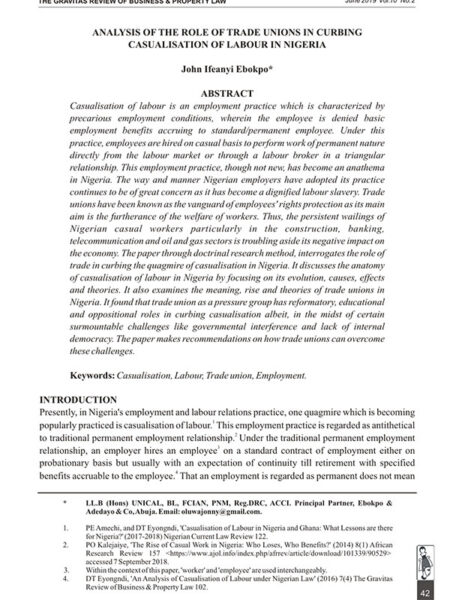
Analysis of the Role of Trade Unions in Curbing Casualisation of Labour in Nigeria
0₦2,500.00John Ebokpo in his article, Analysis of the Role of Trade Unions in Curbing Casualisation of Labour in Nigeria, examines the categories, framework, causes and effects of casualisation of labour. He considers how the reformatory, educational and oppositional roles of trade unions may curb the blight despite the unions’ lack of internal democracy and government interference in their affairs.
-
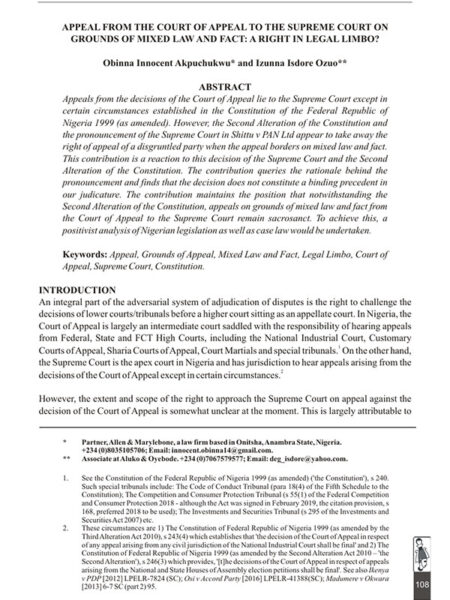
Appeal from the Court of Appeal to the Supreme Court on Grounds of Mixed Law and Fact: A Right in Legal Limbo?
0₦2,500.00Obinna Akpuchukwu, Partner Allen & Marylebone and Izunna Ozuo, Associate at Aluko & Oyebode in their article, Appeal from the Court of Appeal to the Supreme Court on Grounds of Mixed Law and Fact: A Right in Legal Limbo? note that Appeals from the decisions of the Court of Appeal lie to the Supreme Court except in certain circumstances established in the Constitution. However, a pronouncement of His Lordship Bode Rhodes-Vivour, JSC in Shittu v PAN Ltd and the Second Alteration of the Constitution appear to take away the right of appeal of an aggrieved party when the appeal borders on mixed law and fact. Obinna and Izunna query the rationale behind the pronouncement and argue that the decision does not constitute a binding precedent in Nigerian judicature. They opine that notwithstanding the Second Alteration of the Constitution, appeals on grounds of mixed law and fact from the Court of Appeal to the Supreme Court remain sacrosanct.
-
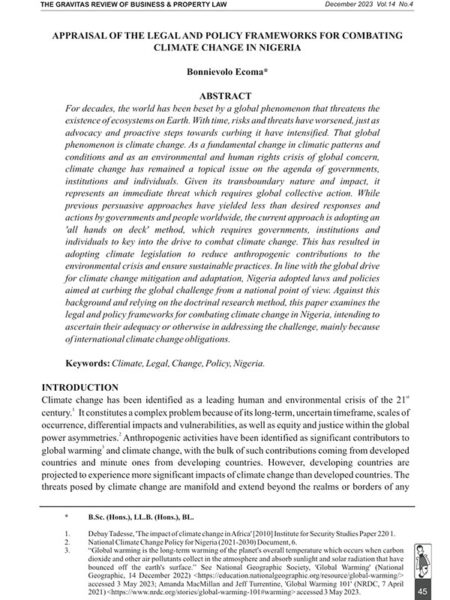
Appraisal of the Legal and Policy Frameworks for Combating Climate Change in Nigeria
0₦2,500.00Bonnievolo Ecoma, in this article, Appraisal of the Legal and Policy Frameworks for Combating Climate Change in Nigeria, appraises the legal and policy frameworks for combating climate change in Nigeria. For decades, the world has been beset by a global phenomenon that threatens the existence of ecosystems on Earth. With time, risks and threats have worsened, just as advocacy and proactive steps towards curbing it have intensified. That global phenomenon is climate change. As a fundamental change in climatic patterns and conditions, and as an environmental and human rights crisis of global concern, climate change has remained a topical issue on the agenda of governments, institutions, and individuals. Given its trans-boundary nature and impact, it represents an immediate threat which requires global collective action. While previous persuasive approaches have yielded less than desired responses and actions by governments and people around the world, the current approach is the adoption of an ‘all hands on deck’ method which requires governments, institutions and individuals to key into the drive to combat climate change. This has resulted in the adoption of climate legislation aimed at reducing anthropogenic contributions to the environmental crisis, and ensuring sustainable practices. In line with the global drive for climate change mitigation and adaptation, Nigeria adopted laws and policies aimed at curbing the global challenge from a national point of view. Against this background and relying on the doctrinal research method, Ecoma examines the legal and policy frameworks for combating climate change in Nigeria, with a view to ascertaining their adequacy or otherwise in addressing the challenge, especially in view of international climate change obligations.
-
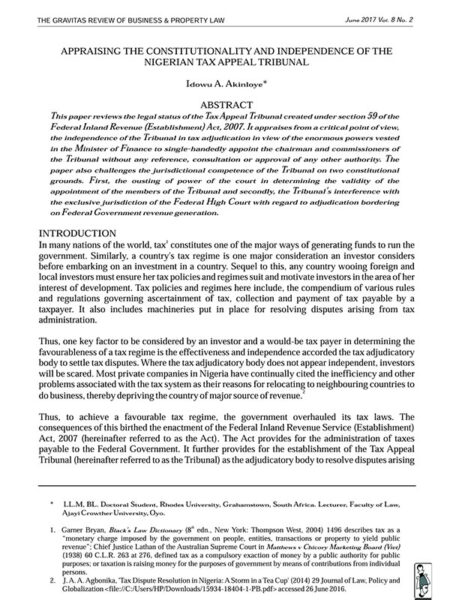
Appraising the Constitutionality and Independence of the Nigerian Tax Appeal Tribunal
0₦2,500.00Idowu Akinloye, of the Faculty of Law, Ajayi Crowther University, Oyo in “Appraising the Constitutionality and Independence of The Nigerian Tax Appeal Tribunal”, examines the jurisdictional competence of the Tax Appeal Tribunal and the constitutionality of its enabling statute, the Federal Inland Revenue Service (Establishment) Act 2007, on several grounds including the likelihood that the appointment of members by the Minister of Finance may not secure the tribunal’s independence and impartiality, ousting of the power of the court in questioning the validity of the appointment of the members offends section 4(8) of the 1999 Constitution, and adjudicating on taxation of companies offends section 251(1) of the Constitution that vests exclusive jurisdiction in such matters in the Federal High Court.
-
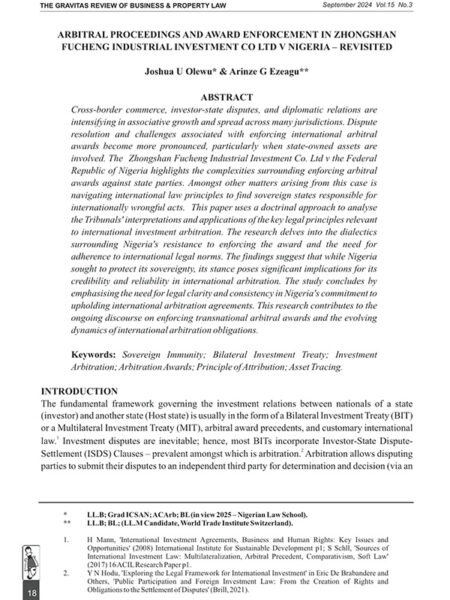
Arbitral Proceedings and Award Enforcement in Zhongshan Fucheng Industrial Investment Co Ltd v Nigeria – Revisited
0₦2,500.00Joshua Olewu and Arinze Ezeagu in their article, Arbitral Proceedings and Award Enforcement in Zhongshan Fucheng Industrial Investment Co Ltd v Nigeria – Revisited, examine jurisdictional issues arising from the enforcement of arbitral award in the celebrated case of Zhongshan Fucheng Industiral investment Co. Ltd v FRN. Cross-border commerce, investor-state disputes, and diplomatic relations are intensifying in associative growth and spread across many jurisdictions. Dispute resolution and challenges associated with enforcing international arbitral awards become more pronounced particularly when state-owned assets are involved. The case of Zhongshan Fucheng Industrial Investment Co. Ltd v Federal Republic of Nigeria highlights the complexities surrounding the enforcement of arbitral awards against state-parties. Amongst other matters arising from this case, is the navigation of international law principles to find sovereign states responsible for internationally wrongful acts. Using a doctrinal approach, Olewu and Ezeagu analyze the Tribunals’ interpretations and applications of the key legal principles relevant to international investment arbitration. The research delves into the dialectics surrounding Nigeria’s resistance to the enforcement of the award and the need for adherence to international legal norms. The findings suggest that while Nigeria sought to protect its sovereignty, its stance poses significant implications for its credibility and reliability in international arbitration. The study concludes by emphasizing the need for legal clarity and consistency in Nigeria’s commitment to upholding international arbitration agreements. This research contributes to the ongoing discourse on the enforcement of transnational arbitral awards and the evolving dynamics of international arbitration obligations.
-
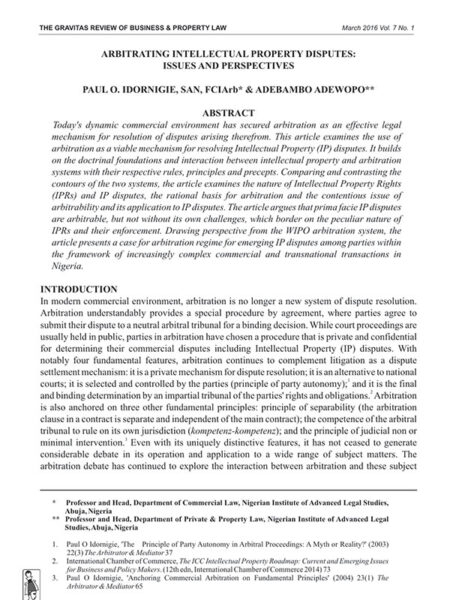
Arbitrating Intellectual Property Disputes: Issues and Perspectives
0₦2,500.00Professor Paul Idornigie, SAN & Professor Adebambo Adewopo, both of the Nigerian Institute of Advanced Legal Studies in their article, “Arbitrating Intellectual Property Disputes: Issues and Perspectives” examines the nature of Intellectual Property Rights (IPRs) and IP disputes, the rational basis for arbitration and the contentious issue of arbitrability and its application to IP disputes. The article argues that prima facie IP disputes are arbitrable, but not without its own challenges, which border on the peculiar nature of IPRs and their enforcement. Drawing perspective from the WIPO arbitration system, the article presents a case for arbitration regime for emerging IP disputes among parties within the framework of increasingly complex commercial and transnational transactions in Nigeria.
-
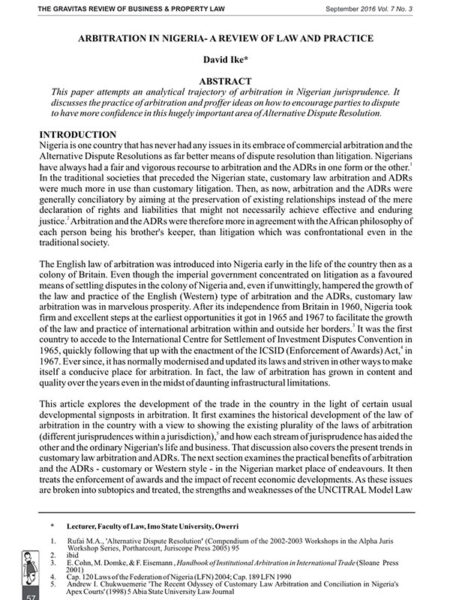
Arbitration in Nigeria – A Review of Law and Practice
0₦2,500.00David Ike, Lecturer, Faculty of Law, Imo State University, Owerri in his article “Arbitration in Nigeria-A Review of Law and Practice” gives an overview of the development of arbitration and its practice in Nigeria. He discusses current issues in arbitration including the constitutionality of section 34 of the Arbitration and Conciliation Act, pre-emptive court proceedings, recognition and enforcement of arbitral awards, and arbitrators’ fees.
The Gravitas Review of Business & Property Law



